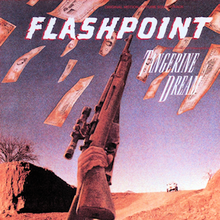
Tangerine Dream is a German electronic music band founded in 1967 by Edgar Froese. The group has seen many personnel changes over the years, with Froese the only constant member until his death in January 2015. The best-known lineup of the group was its mid-1970s trio of Froese, Christopher Franke, and Peter Baumann. In 1979, Johannes Schmoelling replaced Baumann until his own departure in 1985. This lineup was notable for composing many movie soundtracks. Since Froese's death in 2015, the group has been under the leadership of Thorsten Quaeschning. Quaeschning is Froese's chosen successor and is currently the longest-serving band member, having joined in 2005. Quaeschning is currently joined by violinist Hoshiko Yamane who joined in 2011 and Paul Frick who joined in 2020. Prior to this Quaeschning and Yamane performed with Ulrich Schnauss from 2014 to 2020. Schnauss only played two shows with Froese in November 2014 before Froese's passing.
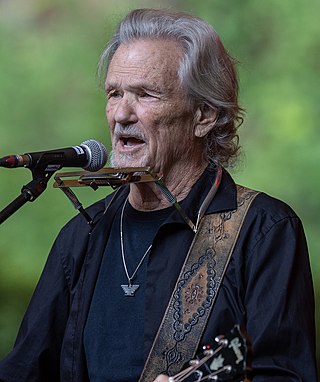
Kristoffer Kristofferson is an American retired country singer, songwriter, and actor. Among his songwriting credits are "Me and Bobby McGee", "For the Good Times", "Sunday Mornin' Comin' Down", and "Help Me Make It Through the Night", all of which were hits for other artists.

Last of the Dogmen is a 1995 American Western film written and directed by Tab Murphy. It stars Tom Berenger, Barbara Hershey, Kurtwood Smith, and Steve Reevis. Set in the mountains of northwest Montana, United States, the film is about a bounty hunter who tracks escaped convicts into a remote region and encounters an unknown band of Dog Soldiers from a tribe of Cheyenne Indians. The film was shot on location in Alberta and British Columbia, Canada, as well as in Mexico. Critical reviews were mixed to positive, though the film was a box office disappointment.

Big Top Pee-wee is a 1988 American comedy film directed by Randal Kleiser. It is the second installment of the Pee-wee Herman trilogy and a standalone sequel to Pee-wee's Big Adventure (1985), the film stars Paul Reubens as Pee-wee Herman with Susan Tyrrell, Kris Kristofferson, Penelope Ann Miller, and Valeria Golino in supporting roles. The original music score is composed by Danny Elfman. It was released on July 22, 1988, and grossed $15 million against a $20 million budget. Another standalone sequel, Pee-wee's Big Holiday, was released in 2016.

Lone Star is a 1996 American neo-Western mystery film written, edited, and directed by John Sayles and set in a small town in South Texas. The ensemble cast features Chris Cooper, Kris Kristofferson, Matthew McConaughey and Elizabeth Peña and deals with a sheriff's investigation into the murder of one of his predecessors. Filmed on location along the Rio Grande in southern and southwestern Texas, the film received critical acclaim, with critics regarding it as a high point of 1990s independent cinema as well as one of Sayles' best films. It was nominated for an Academy Award for Best Original Screenplay, and also appeared on the ballot for the AFI's 10 Top 10 in the western category. The film was also a box office success, grossing $13 million against its $3–5 million budget.
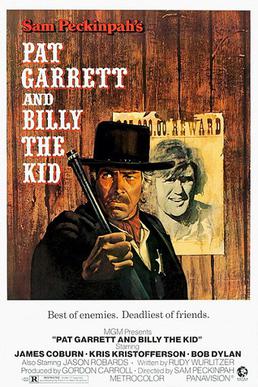
Pat Garrett and Billy the Kid is a 1973 American revisionist Western film directed by Sam Peckinpah, written by Rudy Wurlitzer, and starring James Coburn, Kris Kristofferson, Richard Jaeckel, Katy Jurado, Chill Wills, Barry Sullivan, Jason Robards, Slim Pickens and Bob Dylan. The film is about an aging Pat Garrett (Coburn), hired as a lawman by a group of wealthy New Mexico cattle barons to bring down his old friend Billy the Kid (Kristofferson).

Rollover is a 1981 American political thriller film directed by Alan J. Pakula and starring Jane Fonda and Kris Kristofferson. The film was nominated for a Razzie Award for Worst Actor for Kristofferson.

A Star Is Born is a 1976 American musical romantic drama film directed by Frank Pierson, written by Pierson, John Gregory Dunne, and Joan Didion. It stars Barbra Streisand as an unknown singer and Kris Kristofferson as an established rock and roll star who fall in love, only to find her career ascending while his goes into decline. A Star Is Born premiered at the Mann Village Theater on December 18, 1976, with a wide release by Warner Bros. the following day. A huge box office success, grossing $80 million on a $6 million budget in North America, the film became the 2nd highest-grossing that year. Reviews praised its performances and musical score, but criticized the screenplay and runtime. At the 49th Academy Awards, the film won Best Original Song for its love theme "Evergreen".

The Silver Tongued Devil and I is the second studio album recorded by singer-songwriter Kris Kristofferson. It was produced by Fred Foster, released in July 1971 on Monument Records and followed his critically acclaimed debut Kristofferson.
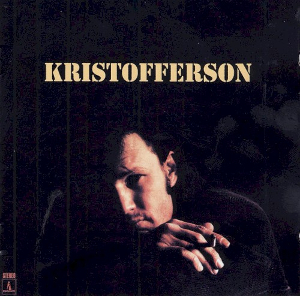
Kristofferson is the debut album of singer-songwriter Kris Kristofferson, which was produced by Fred Foster and released in June 1970 by Monument Records. After working a series of temporary jobs, Kristofferson became a helicopter pilot for oil companies in the Gulf of Mexico. While he worked, he wrote songs and pitched them to singers around Music Row in Nashville, Tennessee during his free time. Kristofferson's songs were recorded by country singers Roy Drusky, Jerry Lee Lewis and Roger Miller and later he persuaded Johnny Cash to try his material. Cash invited Kristofferson to perform with him at the Newport Folk Festival, after which Fred Foster signed Kristofferson to Monument Records as a songwriter and recording artist.
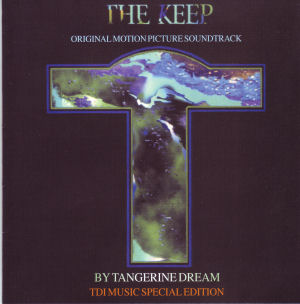
The Keep (1997) is the twenty-third soundtrack album by Tangerine Dream and their fifty-eighth overall. It is the soundtrack to the movie The Keep (1983). A limited run of 150 CDs were sold at a concert by the group in the UK in 1997. Virgin soon announced that the album would be available for general release in early 1998, but legal issues with the film studio stopped the release. In 1999, Tangerine Dream's own record label sold 300 copies of the Millennium Booster album set that included The Keep with a different cover.
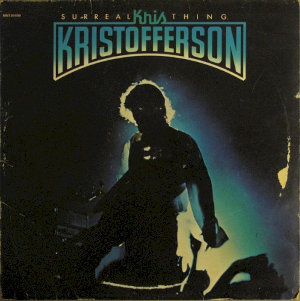
Surreal Thing is the seventh solo album by Kris Kristofferson, released in 1976 on Monument Records. "Killing Time" and "The Golden Idol" are re-recordings of songs that were originally released as a single in 1967.
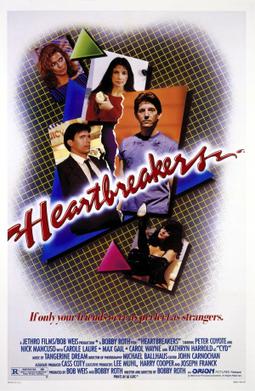
Heartbreakers is a 1984 American drama film starring Peter Coyote and Nick Mancuso. It was written and directed by Bobby Roth. The film was entered into the 35th Berlin International Film Festival.

Johannes Schmoelling is a German musician and keyboard artist. He was a member of the prolific electronic music group Tangerine Dream from 1979 to 1985.

Cisco Pike is a 1971 American drama film that was written and directed by Bill L. Norton, and released by Columbia Pictures. The film stars Kris Kristofferson as a musician who, having fallen on hard times, turns to the selling of marijuana and is blackmailed by a police officer.

Firestarter is a 1984 American science fiction thriller horror film based on Stephen King's 1980 novel of the same name. The plot concerns a girl who develops pyrokinesis and the secret government agency known as The Shop which seeks to control her. The film was directed by Mark L. Lester, and stars David Keith, Drew Barrymore, Martin Sheen and George C. Scott. Firestarter was shot in and around Wilmington, Chimney Rock, and Lake Lure, North Carolina.

Walking Tall: Final Chapter is the third installment of the Walking Tall film series. The film was directed by Jack Starrett. It opened in the U.S. on June 17, 1977; its on-screen title is Final Chapter: Walking Tall. All Walking Tall films were shot in Chester and Madison Counties, Tennessee; Buford Pusser was sheriff of McNairy County.
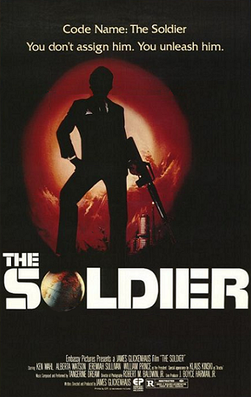
The Soldier is a 1982 American Cold War action-thriller film written, directed, and produced by James Glickenhaus The film stars Ken Wahl, Alberta Watson, William Prince, Joaquim de Almeida, and Klaus Kinski, that featured a cameo by rising country superstar George Strait. The film was shot on location in Philadelphia, Buffalo and New York City, New York, West Berlin, and Israel. The ski sequence was filmed in St Anton am Arlberg in Austria. The original score was composed and performed by the German electronic band Tangerine Dream.

The Bounty Hunter is a 1954 American western film directed by Andre DeToth and starring Randolph Scott, Marie Windsor and Dolores Dorn. It was the last of six Randolph Scott westerns with DeToth and the first film to feature a bounty hunter as its hero. It was released by Warner Bros. It was filmed in 3-D but released in standard format, though a 3-D print exists in the Warner archives. Stock footage from the 1952 film Carson City is used at the beginning of the film. Portions of the film were shot on location in California at Red Rock Canyon and the Mojave Desert.

Blume in Love is a 1973 American romantic comedy drama film written, produced and directed by Paul Mazursky. It stars George Segal in the title role, alongside Susan Anspach and Kris Kristofferson. Others in the cast include Mazursky, Marsha Mason and Shelley Winters.

